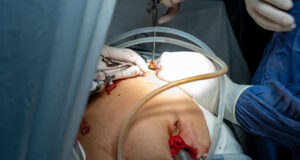Polycystic Ovary Disease (PCOD) or Polycystic Ovary Syndrome (PCOS) is an endocrine disorder in millions of women between their reproductive ages. PCOS typically causes irregular menses, weight gain, acne, facial and other hirsute growth, along with reproductive or fertility issues. Dr. Avhad Hospital’s approach is to maximize holistic wellness-based, long-lasting, health-enhancing changes with correction of the balance of hormones.
These are 7 healthy lifestyle changes for naturally treating PCOD.
1. Adopt a Balanced, Low-Glycemic Diet
Your food is the solution to regulating insulin levels, which directly tie up with PCOD symptoms. Women with PCOD are mostly insulin-resistant, making the hormonal imbalance worse. A low-GI diet of whole grains, legumes, veggies, lean protein, and healthy fat regularizes blood sugar and insulin.
Avoid processed food and white bread, as well as sugars. Replace them with high-fiber foods like berries, leafy greens, quinoa, and oats.
2. Regular Exercise
Exercise raises your body’s sensitivity to insulin, helps maintain weight, and enhances mood. The goal is a minimum of 30 minutes of moderate exercise on most weekdays. This may be walking, yoga, cycling, or dancing.
Consistency is key. You don’t need to exercise at the gym daily—choose exercises you enjoy and can stick with. Exercise regularly reduces symptoms like bloating, fatigue, and hormonal acne.
3. Manage Stress Effectively
Too much stress can ruin your hormones, especially cortisol, which then disrupts insulin and reproductive hormones. Add stress-reducing behavior like meditation, deep breathing, journaling, or walking outside.
We would typically recommend mental health therapy and mindfulness exercises as part of our entire PCOD treatment plan in Dr. Avhad Hospital. A calm mind will typically express itself in the form of a healthy body.
4. Quality Sleep
Poor sleep may disrupt hormonal equilibrium and exacerbate PCOD symptoms. Sleep 7–8 hours straight each night. Create a relaxing pre-bedtime routine—turn off the TV and phone an hour earlier, avoid heavy food at midnight, and ensure your bedroom is dark and cool.
Good sleep aids metabolism, promotes good mental health, and keeps hormone levels in balance.
5. Stay Hydrated
Having enough water to drink is an easy and effective way to maximize hormonal and metabolic functions. Hydration helps digestion, detox, and even weight regulation. Aim for 8–10 glasses of water daily, and reduce sugary drinks, caffeine, and alcohol, which dehydrate and cause inflammation.
6. Healthy Weight Maintenance
Having enough water to drink is an easy and effective way to maximize hormonal and metabolic functions. Hydration helps digestion, detox, and even weight regulation. Aim for 8–10 glasses of water daily, and reduce sugary drinks, caffeine, and alcohol, which dehydrate and cause inflammation.
At Dr. Avhad Hospital, our team works together with the patient to acquire useful exercise and diet regimens in harmony with his/her physiology and lifestyle.
7. Limit Hormone-Disrupting Chemicals
Steer clear of endocrine-disrupting chemicals found in some plastics, cosmetics, and cleaning products. Follow natural skincare, BPA-free storage, and avoid excessive contact with harsh chemical cleaners. These actions may deter further hormonal imbalance and assist your body in its recovery.
Conclusion
Healing PCOD is not an instant change process—it’s a journey of gradual, conscious changes. Most women, with the right direction and guidance, discover that they experience a high degree of relief from their symptoms, energy, and overall well-being.
We approach PCOD treatment at Dr. Avhad Hospital with a personal and compassionate touch. Our skilled gynecologists, nutritionists, and wellness coaches are dedicated to helping you reclaim your health—naturally and efficiently.
If you are suffering from PCOD and want to know about holistic, natural solutions, schedule an appointment with us today. Let’s start on the road to balance and improved health together.





